GARDEN VEGETABLES

30 CROCHET VEGETABLE PATTERNS






The most iconic of the root vegetables is available in a wide range of rainbow varieties. This pattern is so fun and simple that you’ll want to make a whole bunch in different colours. The old wisdom about the benefits of carrots for your eyesight also make this the perfect comforting bedfellow for any little person afraid of the dark.
The body is worked from the top down. Working in Orange
Begin by dc6 into ring
Rnd 1 (dc2 into next st) 6 times (12 sts)
Rnd 2 (dc1, dc2 into next st) 6 times (18)
Rnd 3 (dc2, dc2 into next st) 6 times (24)
Rnd 4 (dc3, dc2 into next st) 6 times (30)
Rnd 5 (dc4, dc2 into next st) 6 times (36)
Rnd 6 (dc5, dc2 into next st) 6 times (42)
Rnds 7–21 dc (15 rnds)
Rnd 22 (dc5, dc2tog) 6 times (36)
Rnds 23–35 dc (13 rnds)
Rnd 36 (dc2tog, dc10) 3 times (33)
Rnd 37 dc
Rnd 38 (dc2tog, dc9) 3 times (30)
Rnd 39 dc
Rnd 40 (dc2tog, dc8) 3 times (27)
Rnd 41 dc
Rnd 42 (dc2tog, dc7) 3 times (24)
Rnd 43 dc
Rnd 44 (dc2tog, dc6) 3 times (21)
Rnd 45 dc
Rnd 46 (dc2tog, dc5) 3 times (18)
Rnd 47 dc
Rnd 48 (dc4, dc2tog) 3 times (15)
Rnd 49 dc
Rnd 50 (dc3, dc2tog) 3 times (12)
Stuff and continue
Rnd 51 (dc2, dc2tog) 3 times (9)
Rnd 52 (dc1, dc2tog) 3 times (6)
Rnd 53 dc
Working in Lime
Make STEMS and then work LEAVES around edge of each STEM.
SHORT STEM (make two)
Begin by dc6 into ring
Rnds 1–28 dc (28 rnds)
Break yarn.
LONG STEM (make one)
Begin by dc6 into ring
Rnds 1–38 dc (38 rnds)
Break yarn.
Sl st into position 16 rnds down stem and then work along stem towards top as follows: *ch9, turn and work back down chain as follows:
sl st1, dc1, htr1, tr5 miss 2 sts and SLIP STITCH TRAVERSE (see page 28) 2 sts along stem
Continues overleaf
MADE IN Orange and Lime (overleaf in Orange and Yellow with Green foliage)
YARN QUANTITIES 50g Vegetable, 50g Foliage
TIME TO GROW Moderate
REQUIRES htr, tr, slip stitch traverse
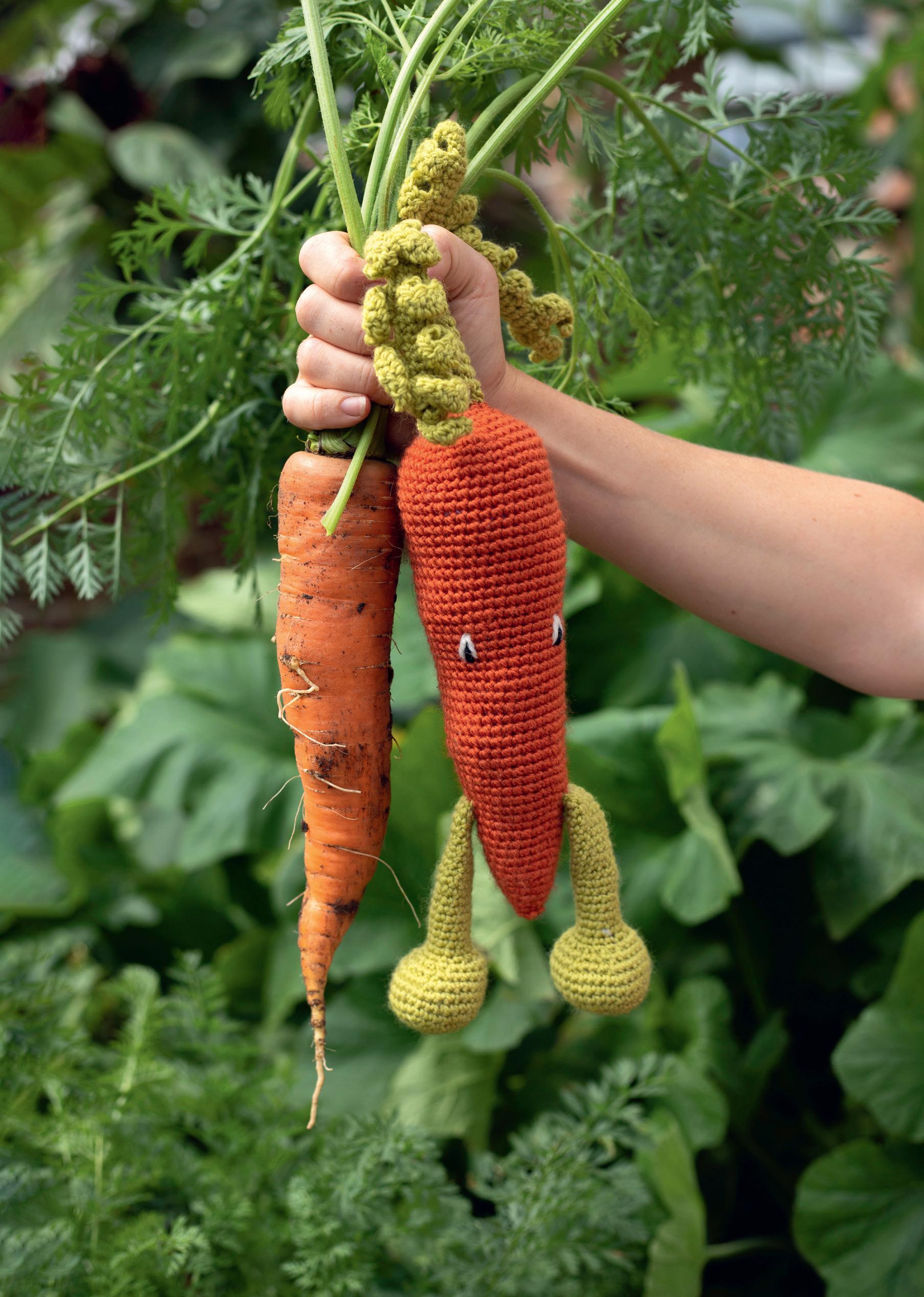
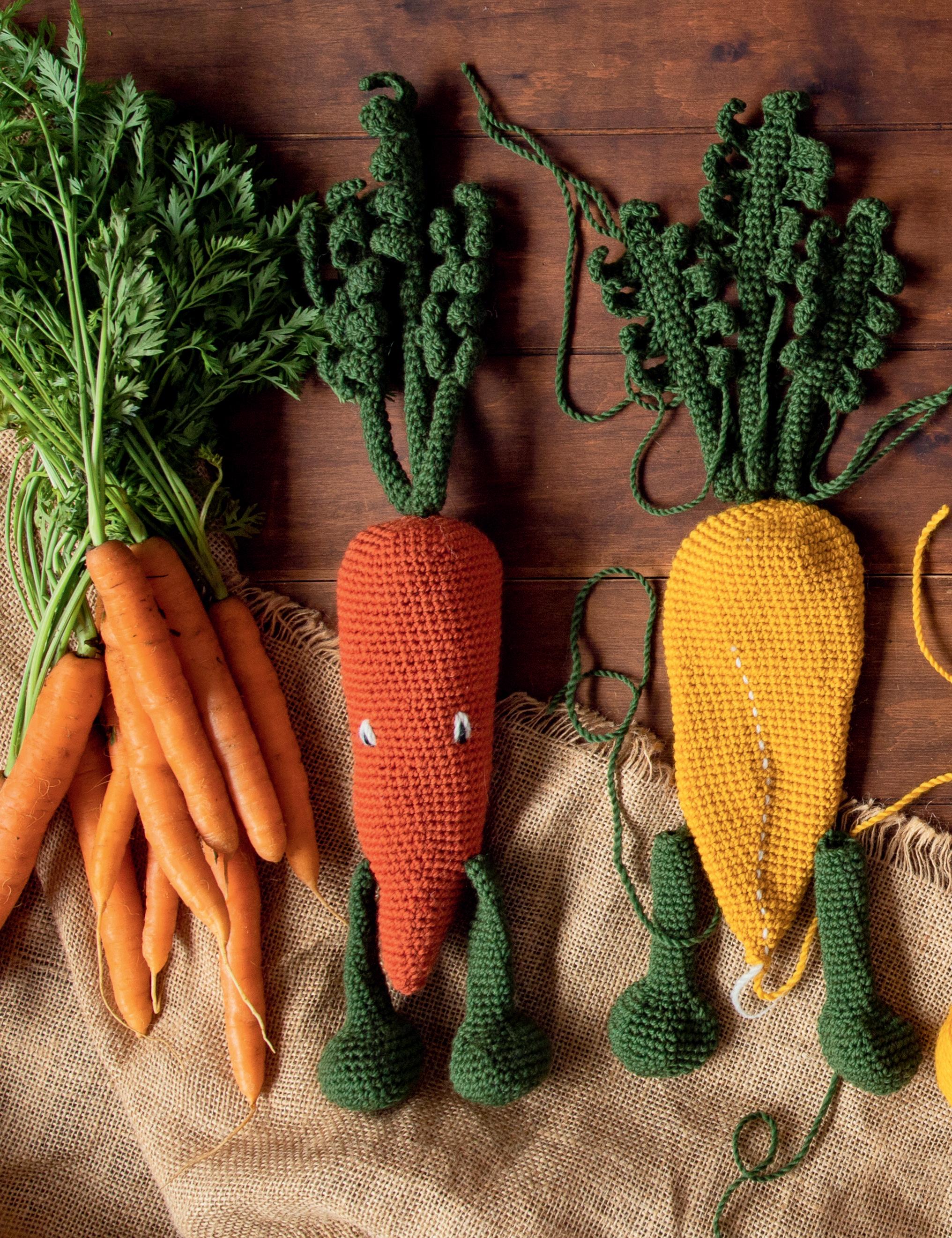
Repeat from * along stem towards top, work one into top and then continue down opposite side.
LEGS (make two)
Working in Lime
Begin by dc6 into ring
Rnd 1 (dc2 into next st) 6 times (12)
Rnd 2 (dc1, dc2 into next st) 6 times (18)
Rnd 3 (dc2, dc2 into next st) 6 times (24)
Rnd 4 (dc3, dc2 into next st) 6 times (30)
Rnds 5–7 dc (3 rnds)
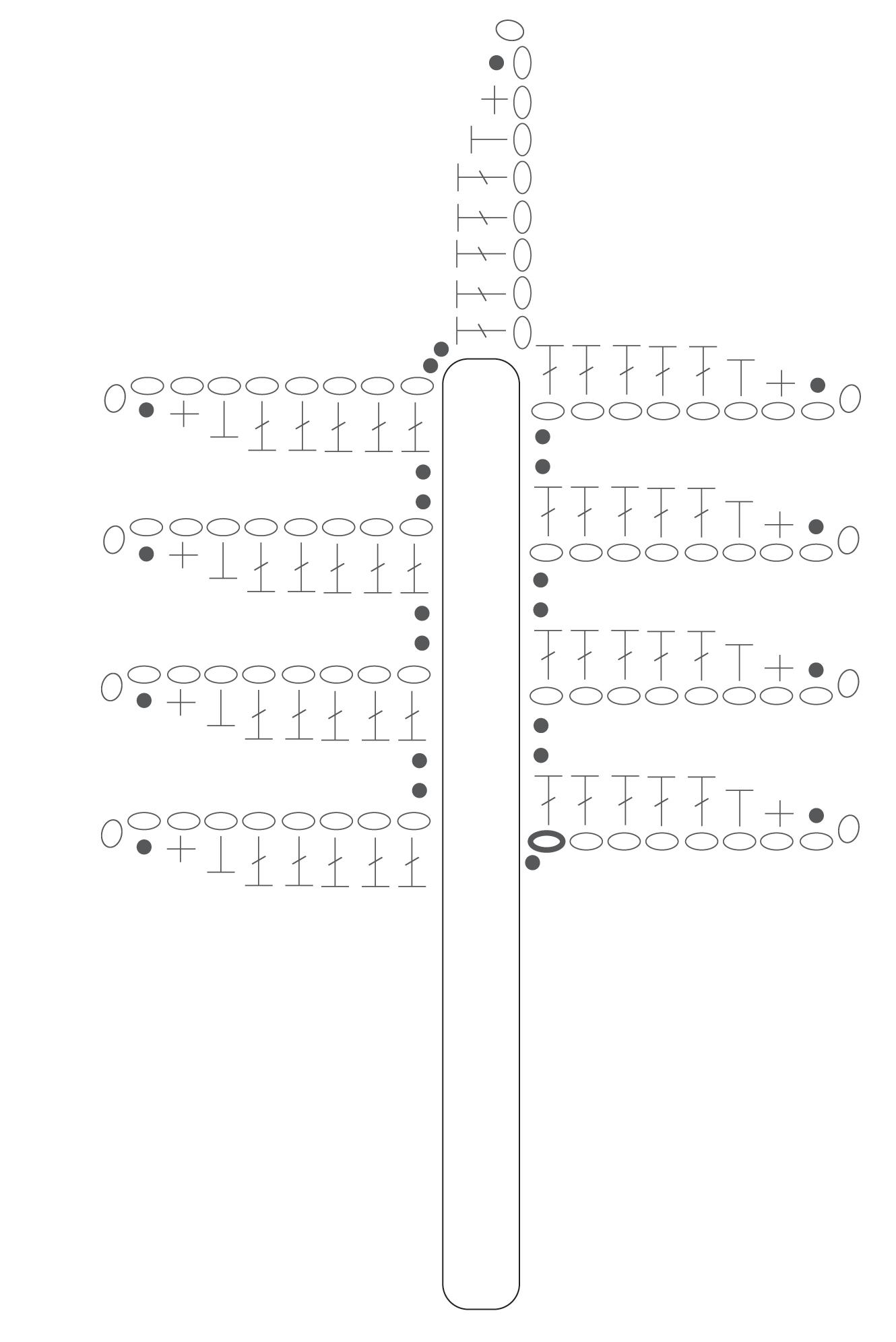
Rnd 8 (dc3, dc2tog) 3 times, dc15 (27)
Rnd 9 (dc2, dc2tog) 3 times, dc15 (24)
Rnd 10 (dc2tog) 12 times (12)
Rnds 11–28 dc (18 rnds)
1. Gather final stitches of BODY to close.
2. Stuff feet and sew tops of LEGS flat perpendicular to foot and sew into position on sides of BODY.
3. Sew in all ends and then sew the three LEAVES together at the tips, with the long leaf in the middle.
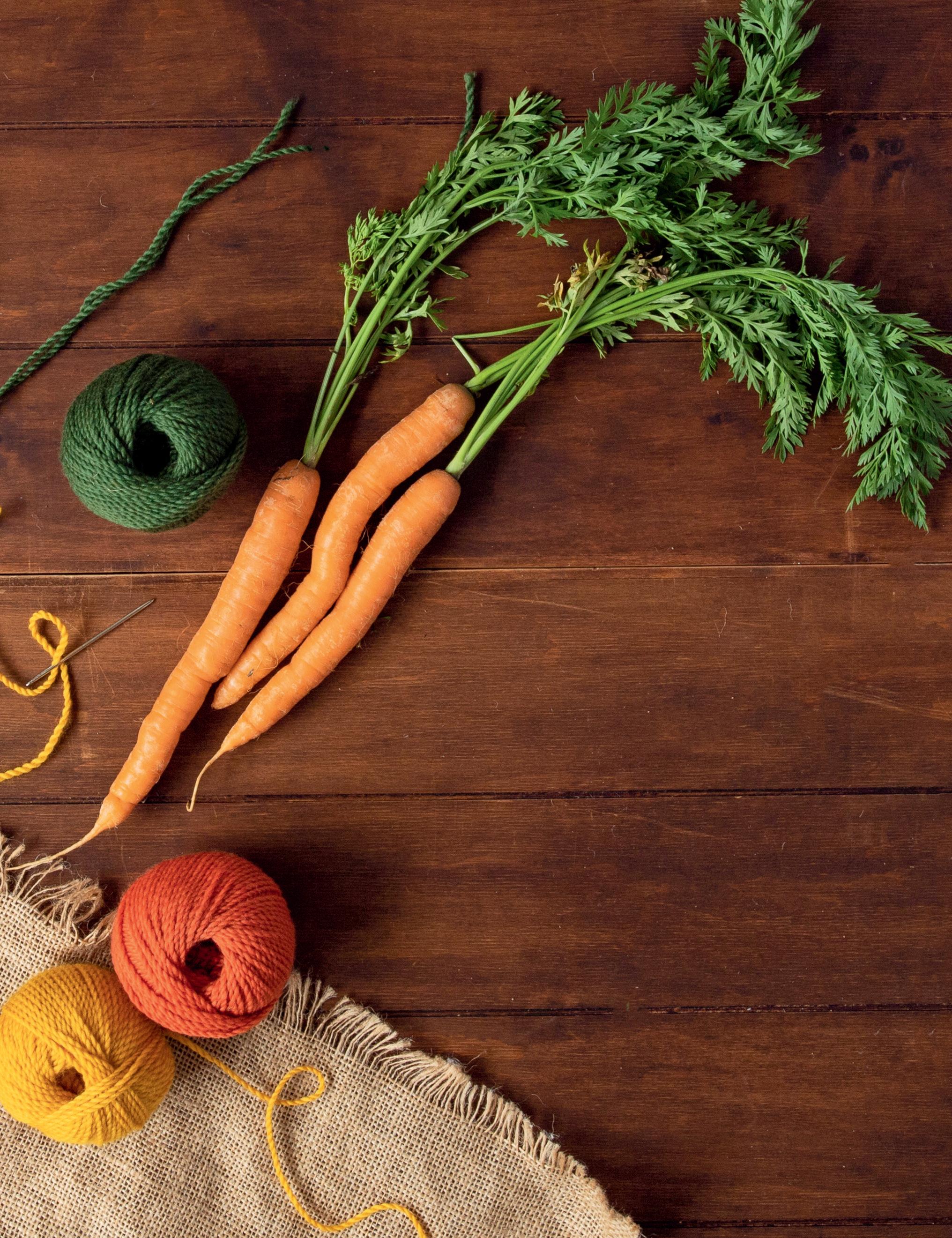
4. Sew LEAVES onto top of BODY.
5. Embroider eyes with Black and Cream yarn.
Although they’re perhaps best enjoyed eaten fresh from the pod in late spring, peas can be frozen, canned, dried or mushed, and they’ve become a staple veg on many of our plates. Ranging from two to twenty peas in a pod, this is one that you’ll have lots of fun making over and over again.
PEA (make three)
Working in Lime
Begin by dc6 into ring
Rnd 1 (dc2 into next st) 6 times (12 sts)
Rnd 2 (dc1, dc2 into next st) 6 times (18)
Rnd 3 (dc2, dc2 into next st) 6 times (24)
Rnd 4 dc
Rnd 5 (dc3, dc2 into next st) 6 times (30)
Rnds 6–10 dc (5 rnds)
Rnd 11 (dc3, dc2tog) 6 times (24)
Rnd 12 dc
Rnd 13 (dc2, dc2tog) 6 times (18)
Rnd 14 (dc2tog) 9 times (9)
POD
Working in Green
Ch21 and work around the chain
Rnd 1 dc19, dc2 into next st along one side of chain, dc19, dc2 into next st along other side of chain (42)
Rnd 2 dc2 into next st, dc2, dc2 into next st, dc13, dc2 into next st, dc2, (dc2 into next st) twice, dc2, dc2 into next st, dc13, dc2 into next st, dc2, dc2 into next (50)
Rnd 3 (dc4, dc2 into next st) 10 times (60)
Rnd 4 (dc2 into next st, dc29) twice (62)
Rnds 5–10 dc (6 rnds)
Rnd 11 dc2tog, dc2, dc2tog, dc25, dc2tog, dc2, dc2tog, dc25 (58)
Rnd 12 (dc2tog) twice, dc25, (dc2tog) twice, dc25 (54)
Rnd 13 (dc2tog) twice, dc23, (dc2tog) twice, dc23 (50)
Rnd 14 dc
CALYX (make one)
Working in Green
Ch12 and sl st to join into a circle
Rnds 1–3 dc (3 rnds)
Rnd 4 (dc2tog) 3 times, dc6 (9)
Rnd 5 (dc1, dc2tog) 3 times (6)
Rnds 6–7 dc (2 rnds)
Rnd 8 (dc2tog, dc1) twice (4)
LEGS (make two)
Working in Green
Begin by dc6 into ring
Rnd 1 (dc2 into next st) 6 times (12)
Rnd 2 (dc1, dc2 into next st) 6 times (18)
Rnds 3–5 dc (3 rnds)
Rnd 6 (dc2tog) 6 times, dc6 (12)
Rnd 7 (dc2tog) 3 times, dc6 (9)
Rnds 8–15 dc (8 rnds)
Continues overleaf
MADE IN Lime and Green (overleaf in Chive)
YARN QUANTITIES 25g Pea, 25g Pod
TIME TO GROW Moderate
REQUIRES Just the basics!
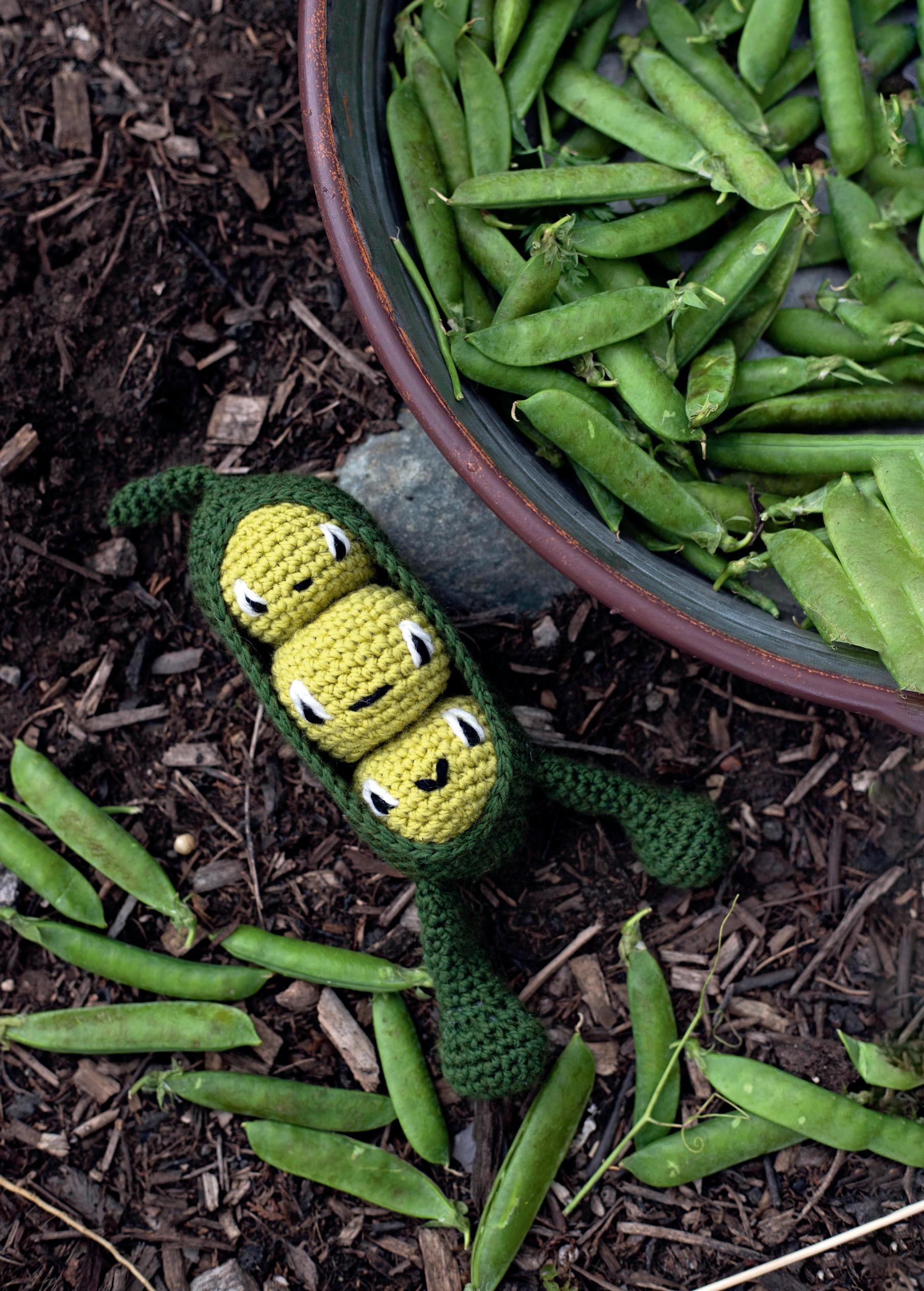
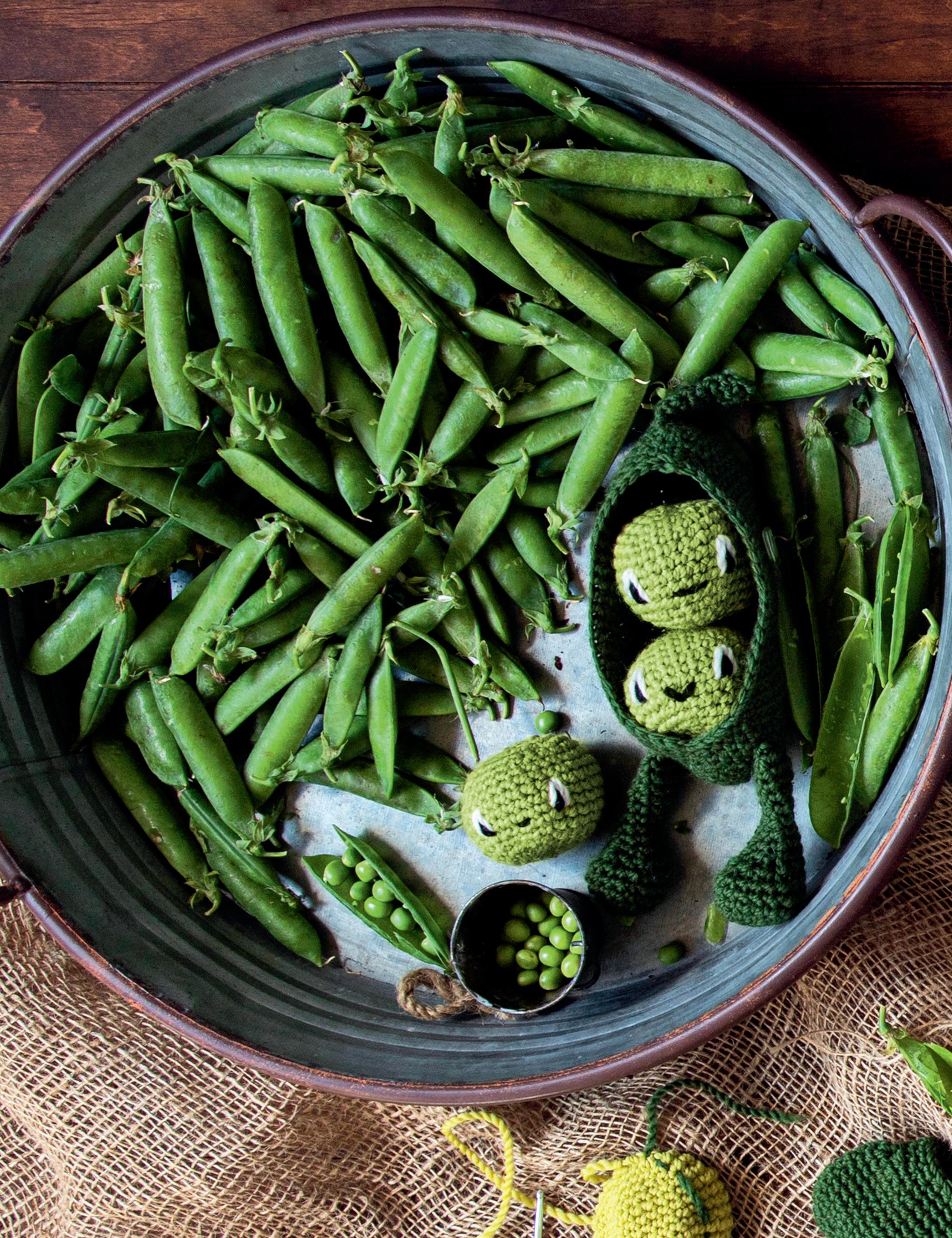
1. Stuff PEAS and gather final stitches to close.
2. Insert three PEAS into POD.
3. Sew CALYX into position at top of POD.
4. Stuff feet and sew top of LEGS flat perpendicular to foot, then sew into position on bottom of POD.
5. Embroider eyes onto PEAS with Black and Cream yarn, and add facial expressions as desired in Black yarn.
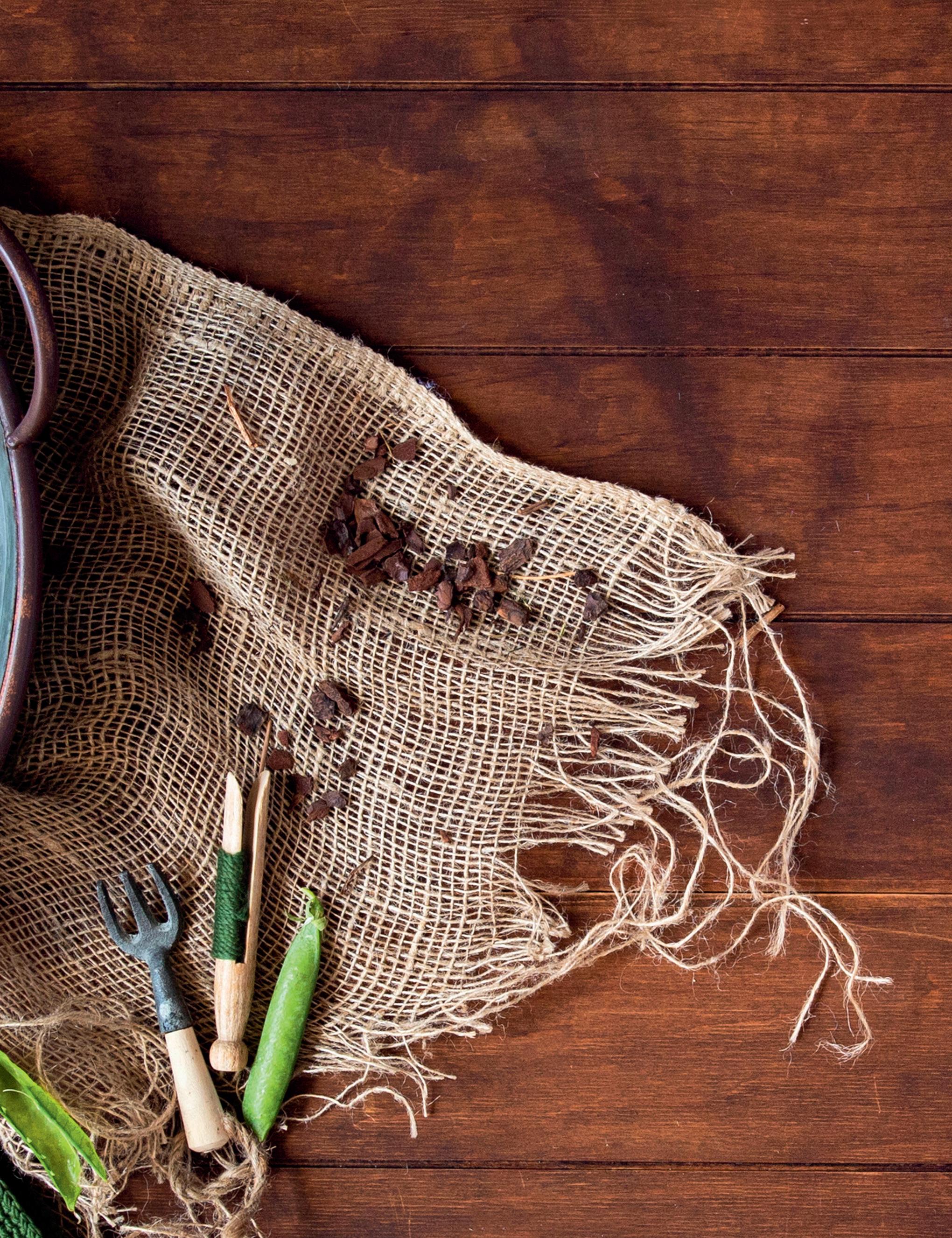
Corn is a wild grass and this pattern is for an ‘ear’ of corn with each crocheted bobble representing a kernel. On average, a real ear of corn is made up of 800 kernels, so although this might feel like a slower make, at least you’ve only got 219 bobbles to make!
MLB
Make Large Bobble (through on fifth repeat) (yarn over hook, insert hook into stitch, yarn over and bring through, yarn over and bring through first 2 loops) 4 times, yarn over hook, insert hook into stitch, yarn over and bring through, yarn over and bring through all loops on hook.
MSB
Make Small Bobble (through on fourth repeat) (yarn over hook, insert hook into stitch, yarn over and bring through, yarn over and bring through first 2 loops) 3 times, yarn over hook, insert hook into stitch, yarn over and bring through, yarn over and bring through all loops on hook.
COB
Working in Lime
Begin by dc6 into ring
Rnd 1 (dc2 into next st) 6 times (12 sts)
Rnd 2 (dc1, dc2 into next st) 6 times (18)
Rnd 3 (dc2, dc2 into next st) 6 times (24)
Rnd 4 (dc3, dc2 into next st) 6 times (30)
Change to Yellow
Rnd 5 (dc4, dc2 into next st) 6 times (36)
Rnd 6 (dc5, dc2 into next st) 6 times (42)
Rnd 7 (MLB, dc2) 14 times
Rnd 8 dc
MADE IN Yellow and Lime (overleaf in Primrose)
YARN QUANTITIES 50g Corn, 50g Husk
TIME TO GROW Slow
REQUIRES htr, tr, dtr, bobbles, colour change
Rnd 9 (MLB, dc2) 14 times
Rnd 10 dc
Rnd 11 (dc1, MLB, dc1) 14 times
Rnd 12 dc
Rnd 13 (dc1, MLB, dc1) 14 times
Rnd 14 dc
Rnd 15 (dc2tog, MLB, dc2, MLB) 7 times (35)
Rnd 16 dc
Rnd 17 (dc1, MLB, dc2, MLB) 7 times
Rnd 18 dc
Rnd 19 (dc1, MLB, dc2, MLB) 7 times
Rnd 20 dc
Rnd 21 (dc1, MLB, dc2, MLB) 7 times
Rnd 22 dc
Rnd 23 (dc2, MLB, dc1, MLB) 7 times
Rnd 24 dc
Rnd 25 (dc2, MLB, dc1, MLB) 7 times
Rnd 26 dc
Rnd 27 (dc1, MLB, dc2, MLB) 7 times
Rnd 28 dc
Rnd 29 (dc1, MLB, dc2, MLB) 7 times
Rnd 30 dc
Rnd 31 (dc1, MLB, dc2tog, MLB) 7 times (28)
Rnd 32 dc
Rnd 33 (dc1, MSB) 14 times
Rnd 34 dc
Rnd 35 (dc2tog, MSB, dc1, MSB) 5 times, dc2tog, MSB (22)
Continues overleaf


Rnd 36 dc
Rnd 37 (dc2tog, MSB) 7 times, dc1 (15)
Rnd 38 dc
Rnd 39 (MSB, dc2tog) 5 times (10)
Rnd 40 dc
HUSK (make three)
Working in Lime
Ch31, turn and work back down chain as follows:
dc3, htr3, tr3, dtr21
Dc3 across post of dtr and work down other side of chain as follows:
ch3, dtr21, tr3, htr3, dc3
Continue working around edge as follows:
Sweetcorn - Husk
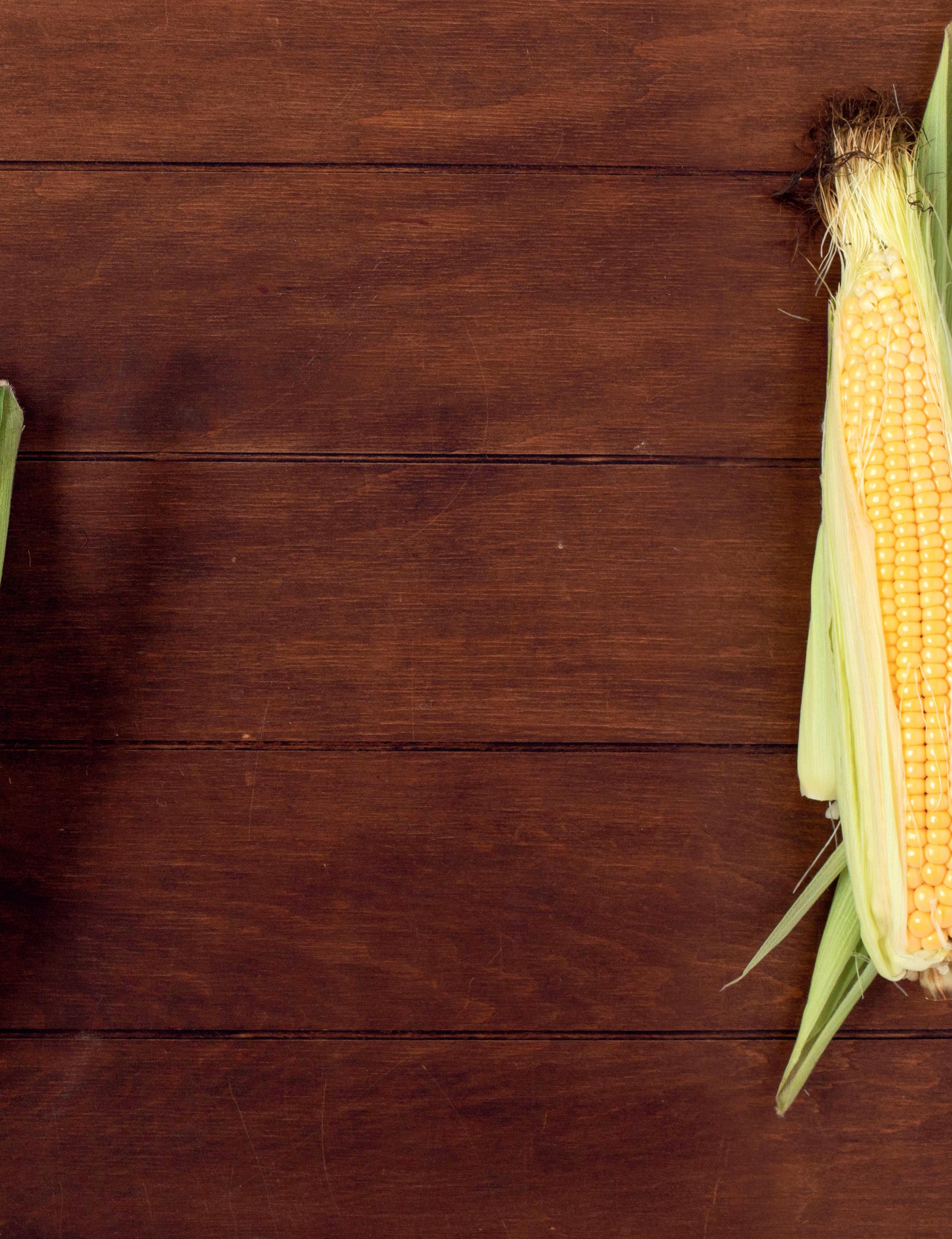
dc3, htr3, tr3, dtr21, dc9 back to other side (3 across post, 3 sts, 3 chains), ch3, dtr21, tr3, htr3, dc3
Break yarn.
LEGS (make two)
Working in Lime
Begin by dc6 into ring
Rnd 1 (dc2 into next st) 6 times (12)
Rnd 2 (dc1, dc2 into next st) 6 times (18)
Rnd 3 (dc2, dc2 into next st) 6 times (24)
Rnd 4 (dc3, dc2 into next st) 6 times (30)
Rnds 5–7 dc (3 rnds)
Rnd 8 (dc3, dc2tog) 3 times, dc15 (27)
Rnd 9 (dc2, dc2tog) 3 times, dc15 (24)
Rnd 10 (dc2tog) 12 times (12)
Rnds 11–18 dc (8 rnds)
ARMS (make two)
Working in Lime
Begin by dc6 into ring
Rnd 1 (dc2 into next st) 6 times (12)
Rnd 2 (dc1, dc2 into next st) 6 times (18)
Rnd 3 (dc2, dc2 into next st) 6 times (24)
Rnds 4–8 dc (5 rnds)
Rnd 9 dc6, (dc1, dc2tog) 6 times (18)
Rnd 10 dc6, (dc2tog) 6 times (12)
Rnds 11–22 dc (12 rnds)
1. Stuff COB and gather final stitches to close.
2. Sew three HUSK pieces onto colour change line on bottom of BODY.
3. Secure HUSK as desired by sewing into place up length of COB.
4. Stuff feet and sew top of LEGS flat, then sew into position towards front of bottom circle.
5. Stuff hands and sew top of ARMS flat, then sew into position on COB on top of HUSK.
6. Embroider eyes with Black and Cream yarn.
Flowers, Kerry Lords delights with 30 friendly vegetables waiting to be brought to life by hook and yarn.
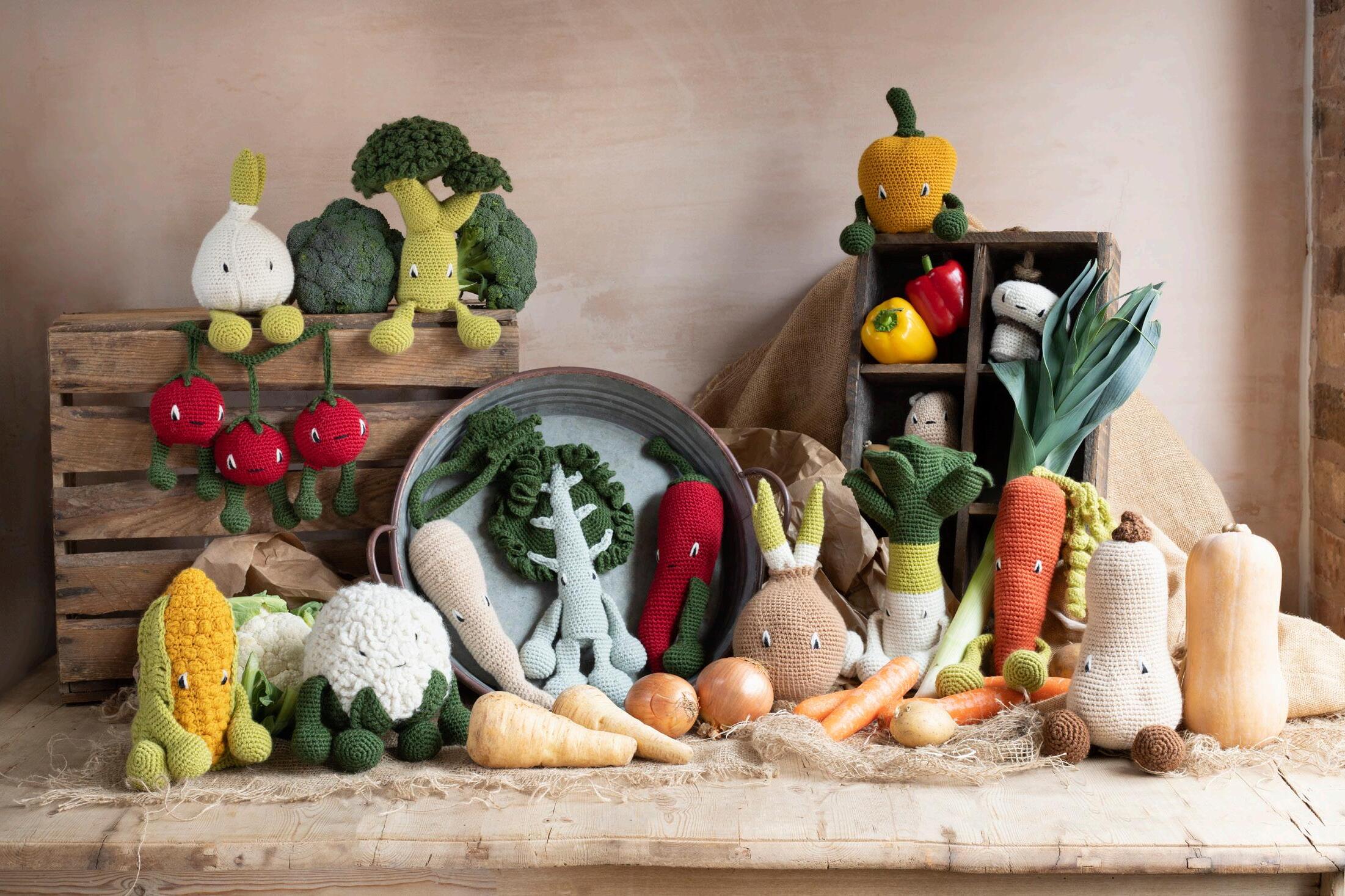
• Well known for her crocheted animals, Kerry Lord heads to her vegtable patch to create these delightfully colourful crocheted produce. No digging needed and the slugs will never eat all your seedlings!
• The 30 patterns include Curly Kale, Radish, Cabbage, Avocado, Artichoke, Peas in a Pod, Bell Pepper, Okra and Garlic. These charming amigurumi-like figures are sometimes crocheted whole, and sometimes seen in ‘sliced’ view so, for example, you get the avocado with a 3D central stone and the lovely veining within a red cabbage.
• Kerry includes step-by-step instructions and charts for each vegetable, including how to assemble and finish, plus a guide to all the basic crochet and sewing techniques needed, so this book is perfect for all skill levels. There’s even a Practice Potato so you can hone your skills before going on to bigger projects.
• As with Kerry’s flowers, there is plenty of scope for individuality. With suggestions for alternative colours, adding legs to and how to embroider eyes.
Kerry Lord is the founder and creative director of the TOFT luxury yarn brand. The yarn brand was born in September 2006, a product of the successful and established family business the Toft Alpaca Stud farm. Kerry is the author of Edward’s Crochet Imaginarium, Edward’s Crochet
Doll Emporium, Edward’s Menagerie: Dogs, Edward’s Menagerie: The New Collection the How to Crochet Animals series and A Partridge in a Pear Tree. She lives in Rugby with her husband, children and dog.
www.toftuk.com


12th October 2023

Hardback | 9780008554002 | UK £25.00
eBook | 9780008554026 | UK £12.99
For publicity enquiries please contact:
UK: PavilionPressOffice@HarperCollins.co.uk
Australia: jo.munroe@harpercollins.com.au
New Zealand: sandra.noakes@harpercollins.co.nz
@PavilionBooks @toft_uk
#alexsgarden